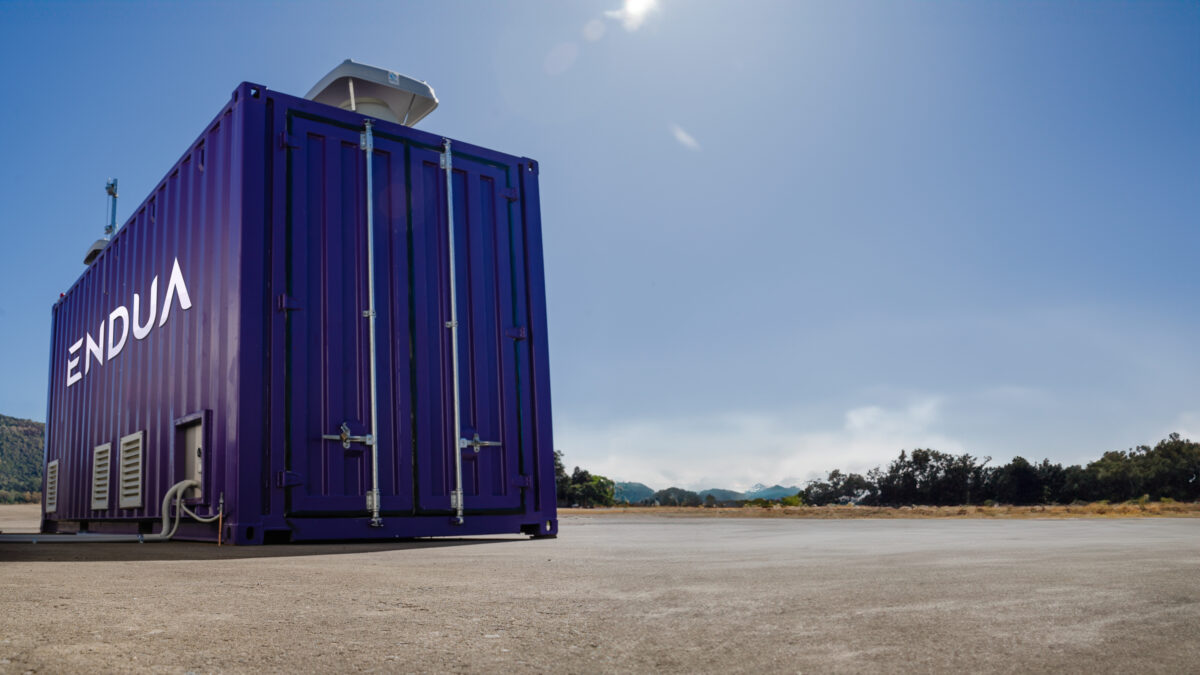To be used as a testing platform, Brisbane-based startup Endua has unveiled its first hydrogen battery in the Brisbane suburb of Archerfield, nearby the company’s headquarters. Endua’s hydrogen power bank uses electrolysis technology developed by the CSIRO and is capable of powering 100kW per unit.
The Archerfield hydrogen battery is roughly six metres long and three metres wide, and provides enough power to drive a water pump, farm shed or standalone telecom infrastructure, Endua said.
The solution is designed to replace diesel generators in off-grid and remote locations, with the company listing farms, telecommunications infrastructure, and microgrid communities as potential users.
Endua’s hydrogen battery works by using renewable energy to power the small-scale, CSIRO-developed PEM (Polymer electrolyte membrane) electrolyser. The hydrogen produced is then stored as a compressed gas, and can be converted back to electricity on demand via the internal fuel cell.
“Our power banks mean we can decouple standalone and microgrid power systems from fossil fuel-generated diesel and provide a cheaper long-term solution than batteries,” Endua chief executive Paul Sernia, founder of EV charger maker Tritium, said.
According to the company, the hydrogen battery is highly configurable and can be scaled according to on-site demand due to its modular design.
Australia, especially Western Australia, has been rapidly deploying solar-driven standalone power stations and microgrids, as these technologies offer significant cost savings compared to maintaining poles and wires or diesel generators. These solutions, however, almost always include a small diesel backup generator. It seems Endua is seeking to fill this ‘last line of defence’ application.
In May, the company announced it had raised more than $11.8 million to scale its hydrogen battery solution. Investors in the raise included the Queensland Investment Corporation (QIC), Melt Ventures, and long-time backers Ampol, Australia’s largest petroleum company, and the CSIRO, Australia’s national science agency.
Founded in 2021, Endua says its chemical and mechanical engineering expertise – which comes particularly from partner Sarb Giddey, Group Leader of the Thermal and Electrochemical Technologies Group in the Energy Technologies Program at CSIRO Energy – as well the use of cheaper materials and mass manufacturing has meant it could develop a “commercially viable” hydrogen battery.
Hydrogen is energy-intensive to make, difficult to store and does is not particularly efficient. Nonetheless, the fact its energy is stored in a chemical composition has made it an intriguing backup solution in many eyes. In May, Australia’s federal government announced its $2 billion Hydrogen Headstart program as part of its 2024 Budget. The Hydrogen Headstart will provide a credit per kilogram on the production price, though this seems to be mostly for large-scale projects.
Endua is currently in the process of commercialising the newly-unveiled 100 kW power bank.
This content is protected by copyright and may not be reused. If you want to cooperate with us and would like to reuse some of our content, please contact: editors@pv-magazine.com.









Not sure how they think using 4x as much kwh input to make the h2, etc, then they get back 25%, is viable.
And a 100kwh pack and inverter is only $25k vs $7.81 US.